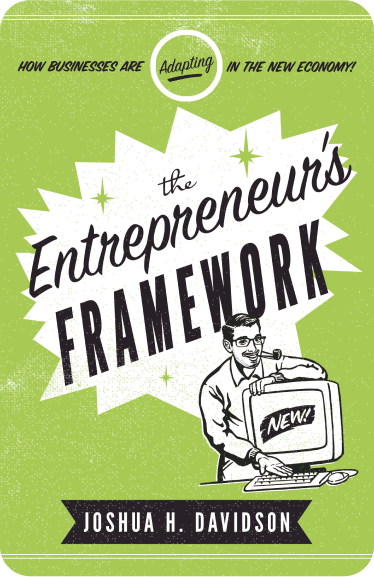When it comes to building a brand for a product or company, there are many different roads you can take. Some brands are mission-driven; others are founder-driven.
The tech/startup industry attracts many founder-driven brands. But why is that?
It could be that the world of tech is quite esoteric and confusing for the everyday person. However, they do understand that it is where a lot of money can be made.
The simple answer is that people want to see that the people they like, support, and can connect with succeed, even if they don’t understand exactly what it is they do.
If people like and trust you, they are more likely to buy into your ventures.
Everyone loves to see someone they can relate to succeed. They want to see someone who is ‘just like them’ make it big!
The Power of Personality
Some notable founder-driven brands include VaynerMedia, named after founder Gary Vaynerchuck (Gary Vee), and 37Signals co-founder Jason Fried.
Fried is better known as the operator behind the popular app Basecamp and Hey.com. When Apple denied republishing the latter post-update, he famously took on the Apple tax via Twitter.
Fried actually managed to drum up enough global publicity to bring Apple to task. This is the potential power of a founder-driven brand.
However, there is no better example of famous founder-driven branding than Elon Musk and his companies.
Founder-Branded Companies Are Not the Norm
Currently, in the public consciousness, it is almost impossible to separate the persona of Elon Musk from his companies.
But this is not the case for most companies. In fact, it’s pretty unusual.
Think about it, do you have any strong opinions about the founder of McDonald’s? Do you have a parasocial relationship with any of the executives at Toyota?
For most people, the answer is no. Even if they drive a Toyota or have been to McDonald’s more times than they can count.
Back to Elon Musk and the Pros and Cons of Persona
In this post, we will explore how intertwining his persona with his companies’ brands has helped skyrocket Tesla to unprecedented growth. It also helped Musk take over Twitter.
However, it cannot be denied that this tactic also has its pitfalls. Criticism against Elon Musk seems to grow stronger all the time.
After all, persona-branding can make your brand, but it also has some big potential weaknesses. This can be seen clearly with Elon Musk.
Ultimately, should you consider using the power of persona to bolster your brand?
Let’s take a look.
Elon Musk’s Persona Is A Big Part Of What Made His Success
The argument could be made that building a globally known persona as an eccentric genius is a big part of what has catapulted Elon Musk to incredible wealth and success.
Detractors say that Musk is all persona and no substance. However, it can not be denied that he is influential and this persona has done incredible things for him.
It is often reported that he is the world’s richest person.
Through Twitter, he has cultivated a more than 100 million-person following. Many hang on his every word, awaiting musings and memes. He has amassed a large cult following.
He is a polarizing figure, but many have been able to properly harness controversy to their benefit. There is debate about whether Elon Musk is effectively doing that or not.
Again, he has both critics and die-hard supporters.
The Formula for Success?
For years, people wanted to root for Musk. They had incredible confidence in him and believed that he could never fail.
Some still feel this way.
This has likely played a large role in his being able to raise large sums of money for almost any project from other investors and institutions, seemingly at will.
He was able to go from complaining about Twitter on Twitter to taking over the entire company in a matter of months.
In general, the public, investors, and EV buyers had seemingly unshakeable confidence in him for many years. His persona has played a massive role in generating this result.
But, now that some holes have started to show in that persona, many people are beginning to ask questions.
The Benefits of Branding Around Persona
When it comes time to market a company or a product, it is not uncommon for people to feel stuck.
How do we market to people? How do we connect with an audience?
Something we have talked a lot about on the blog is the power of storytelling when it comes to branding and marketing.
Ultimately, most people do not make decisions logically. They respond to emotion and narrative more than numbers.
As people build relationships naturally with others, it can seem like an obvious choice to create a brand figurehead that they can latch onto and relate to.
But, how can you truly cultivate an effective parasocial relationship?
Enter Social Media
Social media is a powerful tool for founders to build momentum in the tech industry and startup world.
Many want to harness this power, especially when news headlines can be generated from a single tweet.
This is how founder-driven brands can find great success in a crowded marketplace.
Building a loyal fanbase around a cult of personality can add credibility to a venture and generate a built-in customer base.
And who doesn’t want that?
The Mystery Surrounding Elon Musk’s Cult of Personality
There are several conflicting stories out there about Elon Musk’s early life. One is that he learned to code young, and from humble beginnings has become a wild success. That is the kind of story that people like.
Especially in the US, people love a rags-to-riches underdog story. That is a persona that many people find aspirational and want to support.
Something interesting about Elon Musk is that while his supporters consider him a true underdog hero, his detractors tell a different story.
They say that his father was a wealthy investor in an African emerald mine, which kickstarted his son’s life of privilege. Elon Musk’s own father corroborates this story, while Elon Musk denies it.
An Effective Persona Requires Some Mystery
Even Elon Musk and his own father disagree on key details of his early life, adding to the overall confusion.
However, it did add a sort of intriguing mystique to the overall Elon Musk persona.
Intertwining companies with this persona was definitely an effective way to set them apart from others.
After all, what is cooler than a hyper-successful genius inventor with debated origins?
However, over the years, Elon Musk has chosen to lift the veil with a strong Twitter presence. Some would argue that this has destroyed that persona.
The Power of Brand Recognition
There is no denying that Elon Musk’s persona set Tesla apart in the market for years. In the early days, Tesla was more or less the only EV company. Now that is not the case.
Even now, as other major corporations catch up with their own offerings, can you name any of them?
Do you have any strong opinions about them? Most people probably cannot name any of the people behind them.
Unless you are very interested in tech developments or shopping for an EV, it is quite likely that you can’t name almost any other EV makers. This is powerful.
Has Rivian made any big leaps or had any major failures lately? It is likely that 99% of people could not tell you.
These Days, Elon Musk Has A Persona Problem
While this persona may have made him, it could also break him.
When someone is highly exposed to the public eye, it is inevitable that unflattering things will come out about them. This is not unique to Elon Musk. It is part of being a public figure.
However, the way Elon Musk uses his public platform has given a lot of people pause and started to knock down some of that confidence.
When you post many of your political opinions publically, it is inevitable that you will alienate some people.
This is especially true if those opinions are controversial. Many find his use of memes jarring, uncool, and unprofessional, considering his age and professional titles.
A Shift In Consumer Opinion?
According to a Bloomberg report, this persona shift is causing embarrassment to some Tesla owners, as well as making some choose other EV makers entirely, as of about a year ago.
Dennis Levitt, who described himself as a “Musk Fanboy” almost a decade ago, told the publication:
“Over time, his public statements have really come to bother me,” Levitt said, citing the CEO’s spats with US President Joe Biden, among others. “He acts like a seven-year-old.”
This kind of attitude is not unique to Levitt.
Creative Strategies, a California-based customer-experience measurer, mentioned owner frustration with Musk in a study it published in April. A year earlier, research firm Escalent found Musk was the most negative aspect of the Tesla brand among electric-vehicle owners surveyed.
The Cons of Persona-Powered Branding
Essentially, when you make a public figure the core of your brand, your company’s success may depend on the consumers continuing to like and support that person.
This can be a tricky game to play, as one scandal could alienate almost all of your customers.
In the case of Elon Musk, there have been numerous scandals and alleged wrongdoings. These include (but are not limited to):
- Fathering children with a female employee secretly.
- Having an affair with the co-founder of Google’s wife.
- Firing SpaceX employees who begged him to stop Tweeting in a letter.
- Paying $250,000 to a SpaceX employee who accused him of sexual harassment.
- His seemingly poorly-handled Twitter takeover.
- Manipulating his audience as a part of a crypto pyramid scheme.
- Numerous problems with the quality and safety of the cars Tesla produces.
Here we have the big catch-22 of persona as a part of branding.
High Exposure, High Stakes
As a very prominent and powerful public figure, Musk built an empire.
However, being so deeply embedded in the public consciousness means that all of these negatives are also on full display.
He also facilitates this overexposure by tweeting many of his opinions, even if they do not relate to his work.
Musk also does not shy away from using his platform to publically support controversial political candidates or ideas. Many high-profile public figures avoid doing this, as it is a lose-lose situation.
Regardless of where you stand, if you publically express extreme political opinions, you will alienate many people.
Some praise him essentially for ‘having no filter’ and find his straightforwardness refreshing, as they share his views. Others have been incredibly turned off by his public persona and the projects which are intertwined with it.
If enough people decide that they don’t want to associate with him, and therefore don’t do business with him, that would be a big problem for his companies.
The Pitfalls of ‘Keeping It Real’
Many people, institutions, and corporations don’t want to be publically associated with any kind of extreme political beliefs on either side.
Twitter already experienced turbulence when many large companies stopped using the site to advertise, due to Musk’s very libertarian anti-censorship stance.
Bloomberg also talked to Tesla owners who said that being associated with Elon Musk’s tweets is embarrassing.
Some people find the memes he shares funny and relatable. For others, they have played a big role in poking holes in the ‘mysterious genius persona’ of Tesla’s early days.
A YouTube chef in LA even told Bloomberg that he wouldn’t even want to be seen with a Tesla “if he won one.”
Final Thoughts on Elon Musk, Twitter, Tesla, Persona, And Branding
While Elon Musk has had a dedicated fanbase for years, it seems he is starting to gain more vocal detractors, which is an inevitability of longtime exposure to the public eye.
One of the lessons here may be, that if you want to build a brand around a persona, some level of strategic mystery is key. Don’t let people get too close to the man behind the curtain, so to speak.
Give enough so that people have something to relate to and hold on to, but not so much that it invites controversy.
Of course, every person is entitled to their own sense of humor and worldview. However, it is probably not in the best interest of any new entrepreneur to publically share personal and controversial opinions that are irrelevant to their work.
Most small business owners or young startups do not have the resources that Elon Musk has. If they lost a large chunk of their supporters for stating controversial opinions publically, it could be devastating.
The vague persona that circulated for years about Elon Musk (mysterious rags-to-riches genius creator) was incredibly effective. It was cool. It was compelling. It was hard not to root for him.
While some still think of him that way, some others think of him as someone who constantly Tweets inflammatory things first and as a creator, inventor, or businessman second.
Elon Musk is a great example of the idea that the very things that can work for you as an entrepreneur when it comes to branding, can just as easily work against you.
Think Beyond Branding
However, it is also important to remember that a company’s success does not depend on branding alone. Market conditions are also key.
For example, Tesla was more or less the only widely known EV option for consumers for years. This is not the case anymore.
Now, that there is more competition, and more information has come out about safety issues with the cars themselves, this may pose a bigger challenge to Tesla than any of Musk’s alleged scandals or inflammatory tweets.
In addition, many large companies deciding to no longer advertise on Twitter may pose more long-term consequences for the site than anything else.
What do you think of all of this? Are you an Elon Musk fan? Comment below!
What do you think? Comment below.
Since 2009, we have helped create 350+ next-generation apps for startups, Fortune 500s, growing businesses, and non-profits from around the globe. Think Partner, Not Agency.
Find us on social at #MakeItApp’n®
















